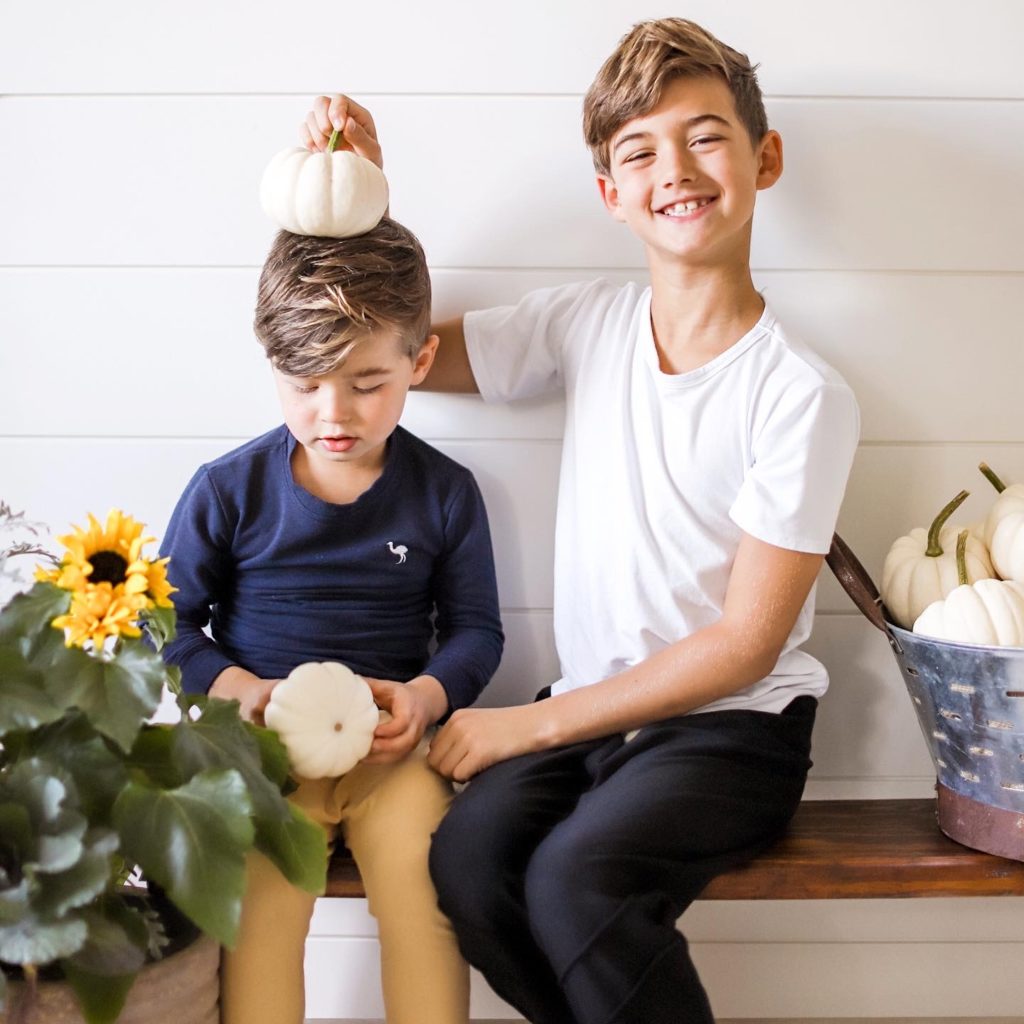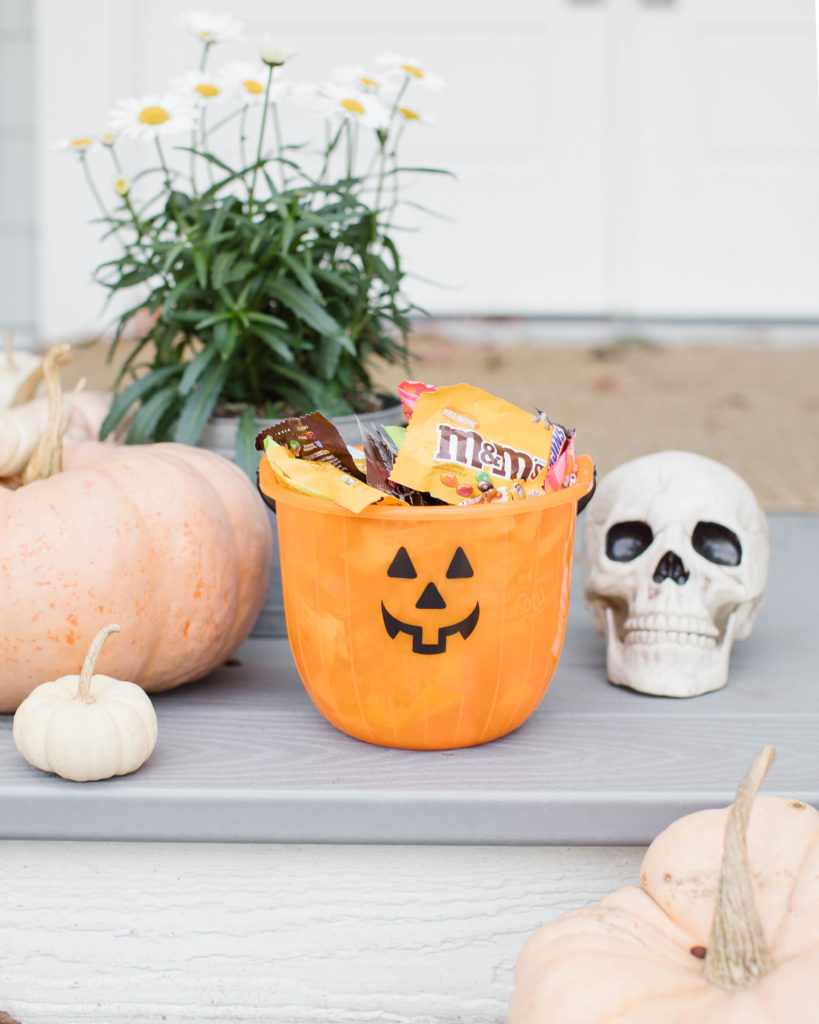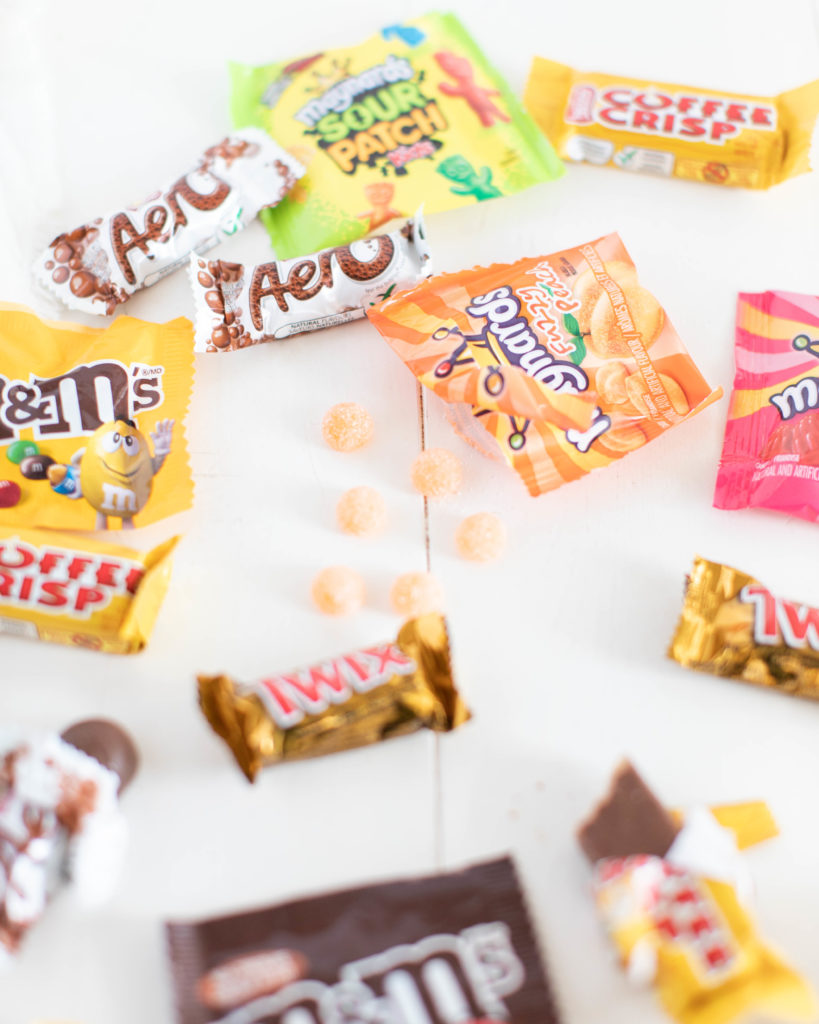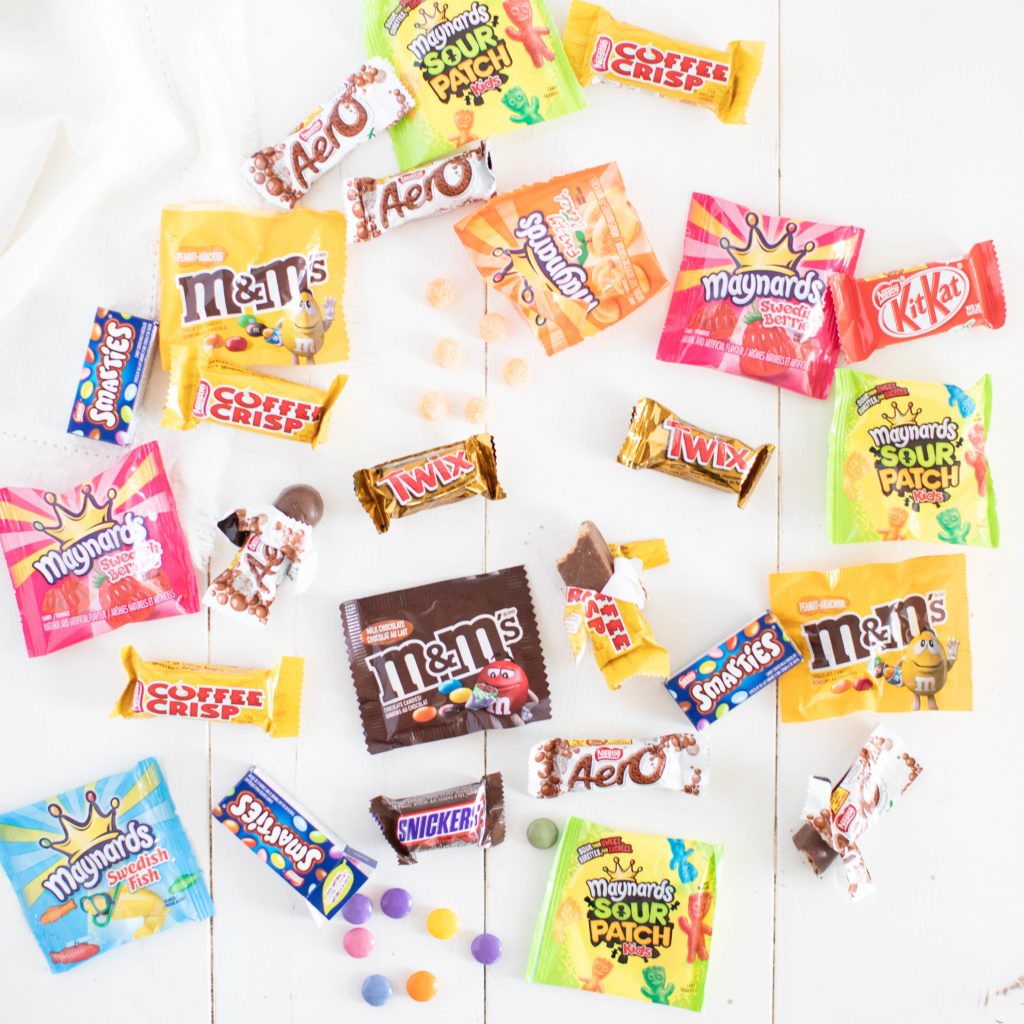Halloween is almost here, and parents near and far are trying to figure out how the heck they’re going to handle the candy-fest that is upon them. If you’re nervous or worried about the influx of candy that is headed your way, you’re not alone! Pediatric registered dietitian Sarah Remmer is on the blog today sharing valuable advice on how to navigate candy with your children and how to raise them to be calm and neutral around treats! Take it away Sarah.

Tips for Managing Halloween Candy
Hey everyone! Sarah here! As a pediatric registered dietitian (and mom of 3), I have some—perhaps surprisingly—good news for you. Halloween is the perfect opportunity to strengthen your child’s long-term relationship with food, especially when it comes to sweets. It can actually help them to learn how to be calm, neutral and mindful around them long-term.
On the other hand, it can also do the opposite. If candy is policed, restricted, and micromanaged, disordered eating patterns can develop, where our kids start sneaking candy, gorging on it, and/or mindlessly consuming it. I say this with kindness and compassion – and I know that ultimately, this is not what any parent wants.

First, consider where your Halloween fears are really rooted:
Where do your fears originate? Most of us grew up in a generation where restrictive practices were commonplace. You may have been told that candy is “bad for you”, will make you “gain weight”, or make you “unhealthy”. These are generational messages and beliefs that are firmly rooted in diet culture and have created life-long struggles with food and body image for many.
Unfortunately, it has become intuitive for many of us to do the same with our own kids (these fears run deep!). We often feel that it’s our job to control if and how much our kids eat, to help them avoid the fate that we were taught “junk food” might lead to.
We might do this by limiting the number of treats our kids consume on Halloween night (or anytime), doing the “Switch Witch”, or taking away our kids Halloween candy. But the truth is, our kids need us to set them up for lifelong eating success; to teach them how be mindful around, and manage, their treats all on their own.
In this post I’ll answer common questions such as:
- What if my kids don’t eat their nutritious foods because they’re too full from candy?
- What if my child goes crazy on Halloween candy and eats way too much?
- What if my kids become addicted to sugar and that’s all they ask for?
- What if they gorge on it and feel sick after?
- How will all that sugar affect their behaviour?
Then, I’m going to walk you through, step by step, how to navigate Halloween in a positive way:
- What to call “treats” and why this is so important
- Letting your child enjoy it, without limits
- How not to be the treat police
- Letting your child make mistakes, and not shaming them for it

Common Questions That Parents Have About Halloween
1. What if they don’t eat their nutritious foods because they’re too full from candy?
If you follow the Division of Responsibility in Feeding (which I highly recommend), you, as the parent, are in charge of what, when and where food happens. You’ll still serve balanced, nutritious meals and snacks on Halloween so that your kids have plenty of opportunity to meet their nutritional requirements, just like any other day. Halloween happens once a year. It’s not every day that candy is flowing left, right and centre. One day, or one week is not going to negatively affect their nutritional status–I promise. Make sure that your child’s meals and snacks contain protein-rich foods (meat, beans/lentils, tofu, nuts, eggs, dairy, etc), fibre-rich foods (fruits, veggies, whole grains) and healthy fats (oils, avocado, nuts, seeds). These nutrients will help your kids to feel satisfied and stable all day.
2. What if my child goes crazy on Halloween candy and eats way too much?
They very well might, and this is ok. One or two days of gorging on candy is not going to make a lick of difference when it comes to their nutritional status, dental health or behaviour. It might result in a tummy ache or feeling yucky, which is not a bad thing – it will teach them to be more mindful next time (in fact, it can be the most powerful natural consequence!).
It’s also important that kids are exposed to sweets year-round, so that when Halloween does come around, it’s not so tempting to overdo it. If it’s rare novelty to have treats around, kids will most definitely go crazy on it. Make it normal by exposing kids to treat foods on a regular basis.
3. What if they become addicted to sugar and that’s all they ask for?
What if I turned this around and told you that restricting it, setting tight limitations on it, or taking it away might create a fixation on it? Think about it… when you’re told that you can’t have something, don’t you want it even more?
Allowing your child to go to town on their treats and have as much as they want on Halloween night will be a thrill for them, but they’ll also learn that it isn’t perhaps as incredible as they thought it would be going into it. Having too much actually doesn’t feel great. They may surprise you and have a few candies and then save the rest, or just lose interest altogether. The more relaxed and calm you are about it, the more they will be too. Rest assured, they will not become addicted to sugar.
4. What if they gorge on it and feel sick after?
Perfect! This is a great natural consequence. Don’t blame or shame, but instead be inquisitive and compassionately curious. Ask them why they think they feel yucky and how they might avoid it in the future. Be mindful about how you approach these questions though…you don’t want to come off as “I told you so”.
5. How does all that sugar affect their behaviour?
There’s actually no evidence to support the idea that sugar makes kids hyperactive. Instead, it’s likely the time and place (and overall energy) that excitement. The very idea of Halloween is exciting to kids, which creates the illusion of hyperactivity.

How to Navigate Halloween in a Positive Way
1. Call them by their names
Calling candy, chocolate, chips etc. “junk food”, “fun foods”, “sometimes foods”, “bad foods”, etc. only create more allure, excitement and anticipation for them. Labeling foods can also create a situation where kids are also labeling themselves… if they’re eating “bad foods”, does that make them “bad”? Children don’t yet have the ability to think abstractly (instead they think in very concrete terms).
All foods offer value – candy on Halloween is FUN, yummy and creates positive memories. It also contains carbohydrates which can help to fuel your body and brain. All valuable! We want to neutralize foods so that certain foods aren’t put on a pedestal or more sought after (candy), and other foods are avoided like the plague (veggies). So, although it may seem like a silly tip, call them what they are: gummy bears, liquorice, chocolate bar, etc. They’re just food!
2. Let your kids enjoy their loot, without limits
Without micro-managing your child’s consumption, let them eat as much as they want on Halloween night*. Your child might surprise you by having a few and then deciding to save the rest (like my son usually does), or gorging on them and eating until they feel sick (like my daughter might).
Either way, it ultimately teaches your child how to self-regulate their intake of treats down the road. It also removes the “forbidden-fruit” factor and takes the urgency to “get it in while you can!” away. It also decreases the chances of your kids sneaking candy or over-indulging when you’re not there.
*kiddos under the age of 2 shouldn’t really be exposed to added sugar for many reasons. I recommend introducing candy and sweets after the age of 2.
3. Don’t be the “treat police”
If you take charge of the candy stash and police when and how much is consumed, you’re sending the message to your kids that that they cannot be trusted with it. In other words, this doesn’t teach them how to moderate their intake of treats. And—without sound like a broken record—it increases the allure and desire for them, which creates bigger issues down the road.
After Halloween night, decide how to manage your child’s candy, depending on age, stage and comfort level. Little ones (ages 2 to 4) typically aren’t old enough to manage their candy stash on their own, so it’s best if you store it, and help them manage it by coming up with a daily amount of candy that seems fair (maybe it’s one, two, or four depending on age) and deciding together when they are going to have it (it could be for dessert after lunch, as part of a snack in the afternoon, or even WITH a meal).
For kids ages 4 and up, they are likely ready to manage and store their own stash with the expectation that they will adhere to the daily amounts that were negotiated and eat their candy in a designated area (usually the kitchen table where there’s few distractions).
Giving kids the opportunity to manage their treats will take some of the power away from it and give them the confidence to manage their treats in a healthy way.
4. Let them make mistakes (and not shame them for it)
Kids learn by making mistakes, and however upsetting it is for us parents to see our kids gorge on treats (and even get sick), ultimately, this will teach our kids to moderate their intake of them.
Instead of getting angry and punishing kids for eating too many candies, approach the situation calmly and get your child to talk about it. Ask her why she thinks she feels sick and what she might do next time to avoid the same feeling again. Explain how the fun is taken out when too many Halloween candies or too much chocolate is consumed. Instead of feeling embarrassed and ashamed, your child will learn from her mistake and think twice before doing it again.
Don’t dread Halloween because of the candy overload. Think of it as a great opportunity to teach your kids about balance, mindfulness, but most importantly, FUN!
Bottom line? This year, consider approaching Halloween with a different mindset (or just take this as a yearly reminder!). Know that your child’s long-term relationship with food and sweets is much more important than their short-term candy consumption and possible over-indulgence. Happy Halloween!
xx Sarah

Dietitian Advice For Parents
For more tips, tricks and advice check out Sarah’s book “Food to Grow On.” follow her on Instagram or read through her blog! Sarah also wrote an incredible blog for us on navigating school lunches and picky eaters HERE.
She also has an on-demand, online Program for parents called Mealtimes Solved that is geared towards parent of kids from preschool to pre-teen. It covers everything you need to know about feeding your kids, including picky eating, weight struggles, body image issues, school nutrition and much more!
Thank you to Sarah Remmer for writing this blog post!

